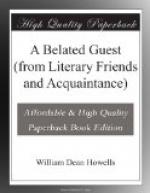It is imaginable of Harte that this temperament defended him from any bitterness in the disappointment he may have shared with that simple American public which in the early eighteen-seventies expected any and everything of him in fiction and drama. The long breath was not his; he could not write a novel, though he produced the like of one or two, and his plays were too bad for the stage, or else too good for it. At any rate, they could not keep it, even when they got it, and they denoted the fatigue or the indifference of their author in being dramatizations of his longer or shorter fictions, and not originally dramatic efforts. The direction in which his originality lasted longest, and most strikingly affirmed his power, was in the direction of his verse.
Whatever minds there may be about Harte’s fiction finally, there can hardly be more than one mind about his poetry. He was indeed a poet; whether he wrote what drolly called itself “dialect,” or wrote language, he was a poet of a fine and fresh touch. It must be allowed him that in prose as well he had the inventive gift, but he had it in verse far more importantly. There are lines, phrases, turns in his poems, characterizations, and pictures which will remain as enduringly as anything American, if that is not saying altogether too little for them. In poetry he rose to all the occasions he made for himself, though he could not rise to the occasions made for him, and so far failed in the demands he acceded to for a Phi Beta Kappa poem, as to come to that august Harvard occasion with a jingle so trivial, so out of keeping, so inadequate that his enemies, if he ever truly had any, must have suffered from it almost as much as his friends. He himself did not suffer from his failure, from having read before the most elect assembly of the country a poem which would hardly have served the careless needs of an informal dinner after the speaking had begun; he took the whole disastrous business lightly, gayly, leniently, kindly, as that golden temperament of his enabled him to take all the good or bad of life.




